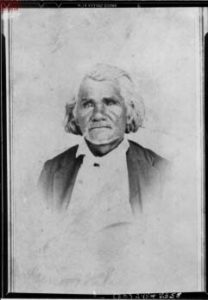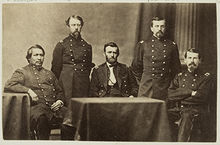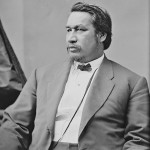During the Civil War, Native Americans fought for both the Confederacy and the Union. Tribes found it difficult to decide which government to trust, since their experience had shown that almost all white men in policy-making positions were untrustworthy. Not all tribes were united in or satisfied with their leaders’ decisions, but Native American soldiers could be depended upon to fight bravely and remain loyal to the cause they had chosen.
Stand Watie was born in 1806 in present-day Gordon County, Georgia. He signed the Treaty of New Echota in 1836, in which a group of Cherokees surrendered their land in the east in exchange for land in the west (Oklahoma). Because he had signed this treaty and given away tribal land, Watie was under a death sentence from the group of Cherokees who had disagreed with the decision. During the Civil War, Watie accepted a commission as colonel in the Confederate States Army and raised the First Regiment of Cherokee Mounted Volunteers. (Watie became principal chief of the western Cherokee when Chief John Ross abandoned the Confederacy.) Watie successfully harassed Union forces and captured the Union steamboat, J.R. Williams. He was promoted to brigadier general in May, 1864.
Ely S. Parker was born in 1828 on the Tonawanda Indian Reservation (Seneca nation) in New York. Parker became a successful engineer and received an appointment from the Treasury Department to oversee the construction of a custom house and marine hospital in Galena (Illinois). There he met Ulysses S. Grant; during the Civil War, he served on Grant’s personal staff and became his military secretary in 1864. (Parker copied the terms of surrender given to Robert E. Lee at Appomattox.) When Grant became president of the U.S., he appointed Parker as Commissioner of Indian Affairs, the first Native American to hold that position.


